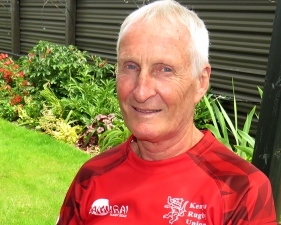Search

 Murray Roulston returned to New Zealand earlier this month after a stint coaching in Kenya. Photo Erin TaskerAs a rugby coach Murray Roulston has travelled the world teaching players the ins and outs of the game he loves, but his latest coaching job was by far the biggest challenge he’d ever tackled.
Murray Roulston returned to New Zealand earlier this month after a stint coaching in Kenya. Photo Erin TaskerAs a rugby coach Murray Roulston has travelled the world teaching players the ins and outs of the game he loves, but his latest coaching job was by far the biggest challenge he’d ever tackled.
Roulston has spent much of the past year in Kenya coaching the national side and trying to build a pathway for the future in a country where rugby was the fastest growing sport, and while he found that there was no shortage of talent, a vital part of the jigsaw puzzle was well and truly in short supply.
That was money.
Roulston said when he arrived, players weren’t coming to training because they hadn’t been paid for three months.
In a country where money and jobs were hard to come by, they simply couldn’t afford to get there.
“The corruption in Kenya is unbelievable.
“You can talk to four different people and you get four different stories and you have to work out who’s talking the most truth, so it’s unbelievably challenging,” Roulston said.
“I can assure you it was the hardest place I’ve ever been in my life for coaching.
“Unless you were there to experience it, you wouldn’t know how tough it was.”
Roulston went to Kenya believing the money, resources and facilities would be what was required to do the job, but quickly found out that things weren’t as they seemed.
There was no set training ground, the gym was barely bigger than a kitchen, and the weights and equipment were old-fashioned.
Basically, the facilities were non-existent, Roulston said.
“I think we had seven different training grounds while I was in Kenya in the first stint, and we had to keep changing because they didn’t have the money to pay the fund for the fields,” Roulston said.
Although there were challenges, there were plenty of positives too, and the biggest one of those was the talent, Roulston said.
“The exciting thing is, in Kenya if they can get their act together the athletes are there.
“The talent is there; the talent is unbelievable,” Roulston said.
“If we were just there to coach the rugby, it would be easy.
“But around every corner, there’s an obstacle.”
He attended schoolboy tournaments and the talent he saw was as good as anywhere in New Zealand.
And Roulston knows his stuff.
After growing up in Mid Canterbury and playing more than 130 games for his home province during what was a golden era for Mid Canterbury rugby, playing for the South Island three times and making All Blacks trials once, Roulston turned to coaching.
He coached Mid Canterbury’s under-18s, then the senior side, before heading to Wanganui in a rugby development officer role.
From there he headed to Otago where he again worked in rugby development for eight years, coaching the Otago B and sevens sides, and running their academy.
He then did a six-week stint in Japan and they wanted him to stay on, but with dreams of coaching Otago, Roulston returned home.
Those dreams were dashed when Otago brought Laurie Mains back from South Africa though, so Roulston decided to head back to Japan.
He returned to New Zealand to take up a role as high performance director of rugby for the Highlanders region, before the Hurricanes came calling.
He spent six years with the Hurricanes before being asked to go to Romania to help out for a couple of months, and from there he headed to Trinidad and Tobago in a director for rugby role.
That was an eye-opening experience that would be topped only by what met him in Kenya, and when he returned from Trinidad just before the Rugby World Cup in 2011, Roulston decided it was time to finish.
That was, until Kenya came calling.
“They phoned up in December 2017 and said ‘we have been looking for a New Zealand coach and we have come up with your name and we want you to come to Kenya’,” Roulston said.
“I said ‘no show’ and left it at that.”
But three days later they called again and tried to talk him around. Roulston said a friend of his in the North Island, Ian Snook, could be the man for the job and suggested he could give him a call.
Snook was keen but said he’d only do it if Roulston went too.
So Roulston decided to give it a go and the pair headed over, with Snook taking on a head coach role and Roulston his assistant.
The pair took up a year contract in Kenya which takes them through to March next year.
But when Roulston returned to New Zealand in December, whether he’d return was still up in the air.
He hadn’t been paid for two months.
Money was one of the biggest challenges in Kenya.
Funding for all sports had dried up, so it was off the park where the biggest challenges came.
On the park, Kenya had piles of potential, Roulston said.
Under Roulston and Snook, Kenya played Uganda in the Elgon Cup before playing in the African Gold Cup where a spot at the Rugby World Cup was on the line.
They played Zimbabwe, Uganda, Morocco, Tunisia and Namibia and won all except the one against Namibia, so the Namibians took that world cup spot.
Kenya had one last chance to qualify for the world cup, through a repecharge in France with Germany, Hong Kong and Canada, but again they missed out.
The team wasn’t helped by the fact that most of their preparation games ended up not happening, and they didn’t know if they’d even be going to the repecharge until two hours before they were due to leave because no one had been paid.
When their money came through, they went.
With money and jobs so hard to come by and only about five of the players playing under Roulston and Snook having some sort of employment, and eight or nine studying, they had to improvise.
They’d train at 6am, to allow the players who did have work to go to, to get there.
But sometimes even getting there was a challenge.
One day a player was a couple of hours late to training; turned out he’d been held up at gunpoint on the way.
That wasn’t an unusual occurrence.
Between his stints in Kenya and Trinidad, Roulston had witnessed his fair share of trouble.
But, he never felt unsafe.
After a challenging eight months in Kenya, Roulston was hopeful about the future of the sport he’d made a career from, in the African nation which had already proven itself to be a threat on the sevens stage.
But he said to get things to where they needed to be in terms of 15s rugby, it was really a five-year programme, and at the moment there just wasn’t the money to make it happen.
“The exciting thing for us is the CEO said that the results we got were the best in Kenyan history,” Roulston said.
“The exciting thing is the players are there, the capability is there, it’s just whether they can ever get their society right from the government down and get the right procedures in place to get the rewards that they deserve.”
Kenya had been a challenge, but it was one Roulston was glad he’d taken on.
“All in all it was a hell of a life experience and I’m so pleased I did it.”
By Erin Tasker © The Ashburton Guardian - 26 December 2018


